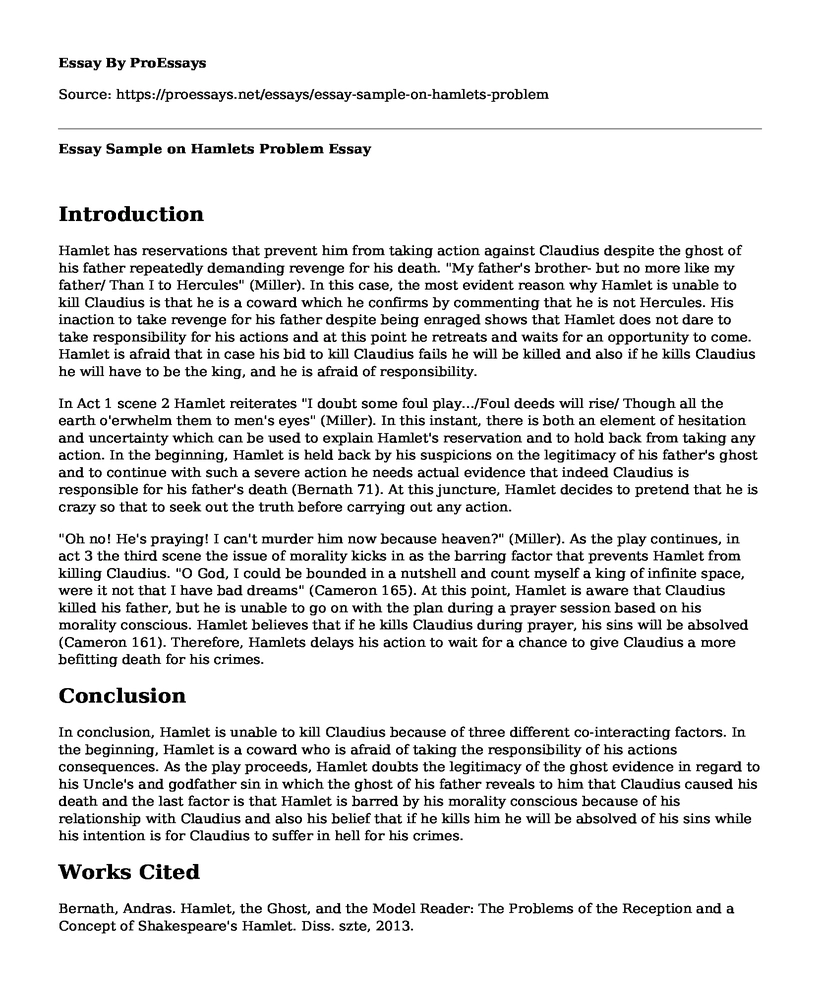Introduction
Hamlet has reservations that prevent him from taking action against Claudius despite the ghost of his father repeatedly demanding revenge for his death. "My father's brother- but no more like my father/ Than I to Hercules" (Miller). In this case, the most evident reason why Hamlet is unable to kill Claudius is that he is a coward which he confirms by commenting that he is not Hercules. His inaction to take revenge for his father despite being enraged shows that Hamlet does not dare to take responsibility for his actions and at this point he retreats and waits for an opportunity to come. Hamlet is afraid that in case his bid to kill Claudius fails he will be killed and also if he kills Claudius he will have to be the king, and he is afraid of responsibility.
In Act 1 scene 2 Hamlet reiterates "I doubt some foul play.../Foul deeds will rise/ Though all the earth o'erwhelm them to men's eyes" (Miller). In this instant, there is both an element of hesitation and uncertainty which can be used to explain Hamlet's reservation and to hold back from taking any action. In the beginning, Hamlet is held back by his suspicions on the legitimacy of his father's ghost and to continue with such a severe action he needs actual evidence that indeed Claudius is responsible for his father's death (Bernath 71). At this juncture, Hamlet decides to pretend that he is crazy so that to seek out the truth before carrying out any action.
"Oh no! He's praying! I can't murder him now because heaven?" (Miller). As the play continues, in act 3 the third scene the issue of morality kicks in as the barring factor that prevents Hamlet from killing Claudius. "O God, I could be bounded in a nutshell and count myself a king of infinite space, were it not that I have bad dreams" (Cameron 165). At this point, Hamlet is aware that Claudius killed his father, but he is unable to go on with the plan during a prayer session based on his morality conscious. Hamlet believes that if he kills Claudius during prayer, his sins will be absolved (Cameron 161). Therefore, Hamlets delays his action to wait for a chance to give Claudius a more befitting death for his crimes.
Conclusion
In conclusion, Hamlet is unable to kill Claudius because of three different co-interacting factors. In the beginning, Hamlet is a coward who is afraid of taking the responsibility of his actions consequences. As the play proceeds, Hamlet doubts the legitimacy of the ghost evidence in regard to his Uncle's and godfather sin in which the ghost of his father reveals to him that Claudius caused his death and the last factor is that Hamlet is barred by his morality conscious because of his relationship with Claudius and also his belief that if he kills him he will be absolved of his sins while his intention is for Claudius to suffer in hell for his crimes.
Works Cited
Bernath, Andras. Hamlet, the Ghost, and the Model Reader: The Problems of the Reception and a Concept of Shakespeare's Hamlet. Diss. szte, 2013.
Cameron, Eileen. "The Psychology of Hamlet." International Journal 2.3 (2014): 161-177.
Miller, Joanne K. Hamlet (max notes Literature Guides). Newburyport: Research & Education Association, 2012. Internet resource.
Cite this page
Essay Sample on Hamlets Problem. (2022, Dec 17). Retrieved from https://proessays.net/essays/essay-sample-on-hamlets-problem
If you are the original author of this essay and no longer wish to have it published on the ProEssays website, please click below to request its removal:
- Essay Example on Evaluation of Mary Shelley's Frankenstein
- The Spanish Caribbean Literature and Culture: Essay Sample
- My Life as a Writer - Essay Sample
- Comparing and Contrasting The Storm and the Yellow Wallpaper
- Critical Essay on Jane Eyre: A Tale of Injustice & the Women's Movement
- Essay Example on Frankenstein: Who Is the Real Monster?
- Essay Example on Leslie Silko's Poem: Exploring Nature's Beauty







